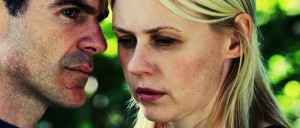

By Mike Wilmington Wilmington@moviecitynews.com
Wilmington on Movies: The Afterlight
The Afterlight (Three Stars)
U.S.: Alexei Kaleina & Craig Macneill, 2009
 A genuine American art film, shot very lovingly, albeit with a low budget, and filled with sometimes stunningly beautiful images of forests, fields and farms in rural upstate New York (Walton), The Afterlight tries unabashedly for pure cinematic poetry, and often gets it. It’s also sometimes pretentious, though not in a way that alienated me, and the story line is often deliberately opaque, though not annoyingly so.
A genuine American art film, shot very lovingly, albeit with a low budget, and filled with sometimes stunningly beautiful images of forests, fields and farms in rural upstate New York (Walton), The Afterlight tries unabashedly for pure cinematic poetry, and often gets it. It’s also sometimes pretentious, though not in a way that alienated me, and the story line is often deliberately opaque, though not annoyingly so.
The story of The Afterlight, by first time filmmakers Alexei Kaleina & Craig Macneill, is set in a short stretch of time before and during a solar eclipse, and it centers on a young couple from the city, smiley but quiet construction worker Andrew (Michael Kelly of The Adjustment Bureau and The Changeling), and pretty, troubled Claire (Jicky Schnee of All Good Things), who try to rescue their relationship (from what we don’t know) by relocating to the country and an old abandoned schoolhouse. There, they slide into internal darkness and angst as they interact with their neighbors, the feisty little girl Lucy (played by local Walton non-professional Morgan Taddeo), the ethereally lovely and slender blind woman Maria (Ana Asensio — and it‘s certainly strange that two knockouts like Claire and Maria are in the same upstate town, never mind neighborhood) and Maria’s melancholy elderly aunt Carol (memorably played by the late Rhoda Pauley, to whom the movie is dedicated).
There’s one other major character, Claire’s father Carl, played by Rip Torn — who, not surprisingly, gives the best performance in this well-acted movie, though his part consists mostly of voice-overs and one scene with Claire that’s virtually a monologue (in which he recounts his disturbing experiences as a prison van driver), and though all of his moments were added in re-shoots after the film was initially completed. Even in these fragments, Torn is superb, and one only wishes there were more of him.
The best of the movie ravishes. The sunlit green tableaux and shadowy interiors of The Afterlight, in which the other characters seem both trapped and restless (like the bird), are so impeccably framed and so astonishingly well-shot, by cinematographer Zoe White (making her feature debut) that your eyes are always rewarded, your mind usually intrigued. Macneill was a student of Stan Brakhage, and, like Brakhage, he and his moviemaking partner Kaleina have a painterly, poetic bent that can slowly, softly mesmerize the viewer.
I liked the movie very much, and when some of its early festival admirers compared it to Michelangelo Antonioni and Ingmar Bergman, they had some justification. The Afterlight is obviously made by filmmakers who know and admire Antonioni and Bergman, and who would probably be pleased by the comparison — and the images, scenes and emotions often suggest those two masters. (More pastoral than urban, the film reminded me a bit more of Bergman than Antonioni — and it reminded me as well of other lyrical Swedes, like Jan Troell, Alf Sjoberg, Arne Sucksdorff and Bo Wideberg.)
Shaping their tale in moods and rhythms far more European in feel than American, Macneill and Kaleina aren’t afraid to fill their scenes with stillness and solitude, to let their fine cast quietly strip their emotions bare, or to offer an occasional visual symbol or two (a caged songbird, a lonely forest, even the eclipse itself). The director-writer-editor pair, and cinematographer White, show a sheer love of moviemaking that often makes their film a joy to watch. (Facets)














Alexei Kaleina? then just wait…
Thanks.